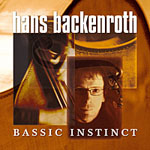Home » Jazz Articles » Album Review » Hans Backenroth: Bassic Instinct
Hans Backenroth: Bassic Instinct
Since then diverse bassists have taken things far further, with much experimentation done in Scandinavia. Red Mitchell, exiled in Stockholm for the duration of the Vietnam War, experimented with different tunings. Then Niels-Henning Ørsted-Pedersen of Denmark brought the liberated bass to the attention of the world when he worked with Oscar Peterson in the 1970s.
In 1984 Pedersen played a concert at Karlstad in southern Sweden. Niels Backenroth, then 18, was in the audience and, inspired by what he heard, decided to purchase a double-bass. Nearly 30 years on, Bassic Instinct is the first album under his own name.
It features six numbers by Backenroth's own quartet, recorded live at Stockholm's Glenn Miller Café, two duets with pianist Kjell Öhman, one with veteran Swedish bassist Georg Riedel and a solo, on which Backenroth plays a tune written by Oscar Pettiford, the phenomenal American-Indian bassist who worked in Copenhagen from 1958 until his death in 1960.
Like Pettiford, Backenroth has a sense of his place in the history of the jazz bass. The album kicks off with his duet with Riedel, titled simply "Double Bass." In stereo Backenroth can be heard on the left, Riedel on the right. Let's face it, there are and always will be certain limitations to the bass as a melodic instrument. And at more than seven minutes, the piece takes a bit of listening to. However, the experience is well worthwhile.
The tracks with Backenroth's quartet are far easier to assimilate. Bernt Rosengren, with whom Backenroth often plays as a sideman, is a revelation on tenor sax; far more relaxed and with a lighter tone than when he's in charge. There's also some nice guitar work from Jacob Fischer.
The two duets with pianist Öhman are Scandinavian songs. "Hvad Er Det, Min Marie" was written by Swedish poet Evert Taube and arranged by Danish pianist Ole-Kock Hansen. "Svallvågor," a lovely, folksy number by Reinhold Svensson, used to be featured by pianist Jan Johansson, with Georg Riedel playing bass. Here, Backenroth plays the melody, accompanied by Öhman.
For his final number, Backenroth plays a solo version of Oscar Pettiford's "Svinninge Blues." He says that playing a Pettiford tune is "a perfect way to start the day." It's also an excellent way to bring a thoughtful, yet thoroughly entertaining album to a close.
Track Listing
Double Bass; Day Dream; With The Wind And The Rain In Your Hair; Hvad Er Det, Min Marie; Little Esther; Little Girl Blue; Svallvågor; Interlude; Prelude In Blue; Svinninge Blues.
Personnel
Hans Backenroth
bassHans Backenroth: bass; Bernt Rosengren: tenor sax; Jacob Fischer: guitar; Roger Johansen: drums; Kjell Öhman: piano; Georg Riedel: bass.
Album information
Title: Bassic Instinct | Year Released: 2010 | Record Label: pb7
< Previous
24 Tales
Next >
Due Reverence
Comments
Tags
For the Love of Jazz
 All About Jazz has been a pillar of jazz since 1995, championing it as an art form and, more importantly, supporting the musicians who create it. Our enduring commitment has made "AAJ" one of the most culturally important websites of its kind, read by hundreds of thousands of fans, musicians and industry figures every month.
All About Jazz has been a pillar of jazz since 1995, championing it as an art form and, more importantly, supporting the musicians who create it. Our enduring commitment has made "AAJ" one of the most culturally important websites of its kind, read by hundreds of thousands of fans, musicians and industry figures every month.



















